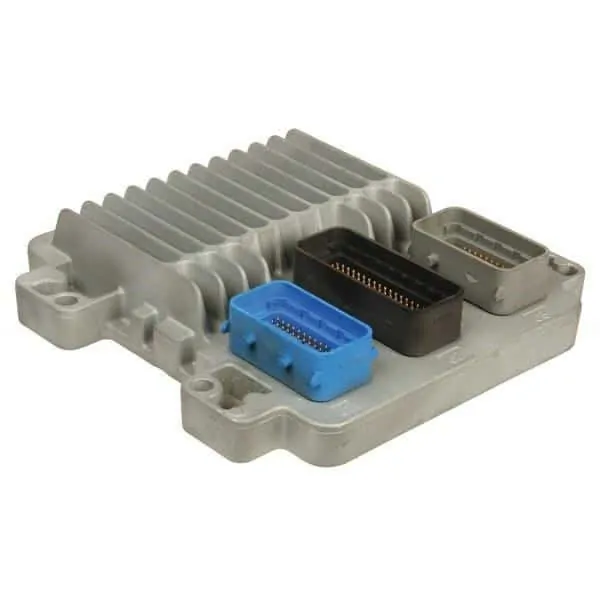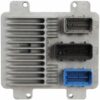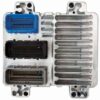Is Your GM Vehicle Running Rough? The Problem Might Be Its Brain.
The Powertrain Control Module (PCM), often called the Engine Control Module (ECM), is the central computer of your 2006 Chevrolet Malibu, Pontiac G6, Buick Rendezvous, or other compatible GM vehicle. It’s responsible for managing everything from fuel injection and ignition timing to transmission shifting and emissions controls. When this critical component begins to fail, it can create a cascade of confusing and frustrating symptoms that can be difficult to diagnose, often leading to unnecessary replacement of other expensive parts.
A faulty PCM can manifest as a persistent check engine light, poor engine performance, decreased fuel mileage, or even a vehicle that won’t start at all. If you’re tired of chasing down elusive electronic gremlins, this pre-programmed Powertrain Control Module is the definitive solution to restore your vehicle’s original performance and reliability.
From the Diagnostic Bay
We once had a 2006 Pontiac G6 3.5L come into the shop that was a real head-scratcher for its owner. He had already replaced two O2 sensors and a mass airflow sensor at another garage, but the check engine light kept coming back with O2 sensor heater circuit codes. After hooking up our diagnostic scanner, we noticed the voltage on the heater circuit was erratic, even with a new sensor. Instead of just throwing another part at it, we tested the circuit directly at the PCM connector. The issue wasn’t the sensor or the wiring; it was a failing driver inside the original module. We installed a correctly programmed PCM, and the problem was solved instantly. It’s a classic case of how a faulty module can send you on a wild goose chase, highlighting the importance of addressing the root cause.
Common Symptoms of a Failing Powertrain Control Module
- ✔ Persistent Check Engine Light: The light stays on, often with communication error codes (U-codes) or multiple, seemingly unrelated sensor codes.
- ✔ Poor Engine Performance: You may experience hesitation during acceleration, a rough or unstable idle, engine misfires, or a general lack of power.
- ✔ Reduced Fuel Economy: A failing PCM can’t efficiently manage the engine’s fuel-to-air ratio, leading to a noticeable drop in MPG.
- ✔ Transmission Issues: The PCM also controls automatic transmission functions. You might notice harsh shifting, delayed engagement, or the transmission getting stuck in one gear (limp mode).
- ✔ Intermittent or No-Start Condition: The engine may crank but refuse to start, or it may start unreliably. This can be caused by the PCM failing to control the fuel pump or ignition coils.
- ✔ Failed Emissions Test: Improper engine management will almost certainly lead to a failed smog or emissions inspection.
Why Choose Our Pre-Programmed 2006 Malibu PCM?
This isn’t just a replacement part; it’s a complete, ready-to-install solution. The biggest hurdle in replacing a modern vehicle computer is the need for expensive, dealer-level programming. We eliminate that step for you. When you order, you provide us with your vehicle’s 17-digit Vehicle Identification Number (VIN). Our technicians then use that VIN to flash the module with the latest, most up-to-date software calibration directly from General Motors. This process ensures that the module is a perfect match for your vehicle’s specific configuration, including its engine, transmission, and emissions equipment.
This service corrects software bugs from the original factory programming and optimizes performance and efficiency. This module, service number 12600928 (interchangeable with 19210070), is a direct-fit replacement for a wide range of 2006-2007 GM vehicles, including:
- 2006 Pontiac G6 (with ID 12600928)
- 2006-2007 Buick Rendezvous (3.5L)
- 2006 Chevrolet Uplander (3.5L)
- 2006 Pontiac Torrent
- 2006 Chevrolet Malibu (3.5L)
- 2006 Chevrolet Equinox
- 2006 Buick Terraza (3.5L)
- 2006 Pontiac Montana SV6 (3.5L)
Please Note: While the module comes fully programmed for engine and transmission operation, you will likely need to perform a simple security relearn procedure after installation. This pairs the new PCM to your vehicle’s anti-theft system and can typically be done without special tools by following a series of key cycles. Instructions are widely available online or in your vehicle’s service manual.
Frequently Asked Questions
Why do I need to provide my VIN?
Your VIN (Vehicle Identification Number) is essential because it allows us to program the PCM with the exact software and calibrations your specific vehicle requires. This includes information about your engine, transmission, tire size, and other factory options, ensuring perfect compatibility and performance.
Is this part truly plug-and-play?
It is pre-programmed to run your vehicle’s engine and transmission, which is the most complex part of the process. However, for security reasons, you will almost always need to perform a security relearn (anti-theft) procedure after installation. This syncs the new module to your keys and is a straightforward process you can often do yourself.
Will this fix my check engine light?
If the check engine light is caused by a faulty PCM, then yes, this will resolve the issue. However, it’s crucial to properly diagnose the vehicle first. This module will not fix problems related to faulty sensors, wiring, or other mechanical components.
How do I find my module’s part number to confirm a match?
The part number is printed on a sticker on the case of your existing module. For these GM vehicles, it’s typically located in the left-hand (driver’s side) front of the engine compartment. You should see a service number (SERV. NO.) that matches 12600928 or 19210070.
What is the difference between a PCM, ECM, and ECU?
The terms are often used interchangeably. ECU (Electronic Control Unit) is a generic term. ECM (Engine Control Module) typically controls only the engine. PCM (Powertrain Control Module) is the most common term for modern vehicles, as it controls both the engine and the transmission systems.


